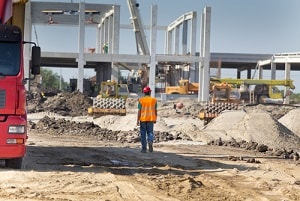What Are Some Common Injuries Suffered on Construction Sites in Illinois?
 Construction jobs can be more dangerous than other types of jobs due to the nature of the work. For example, construction workers often operate heavy machinery to perform their duties, sometimes at extreme heights on scaffolding. According to the Bureau of Labor Statistics, there are approximately 150,000 construction site accident injuries every year in the United States. The reasons for injury can range from improperly maintained equipment, inadequate training, or hazardous workplace conditions. Although some injuries may be minor, others can be debilitating, requiring surgery, physical therapy, or extensive rehabilitation. In some cases, a person may be unable to return to work in the construction field. Workers’ compensation benefits can alleviate some of the medical costs incurred after a work injury. However, in certain situations, a negligent third party could be held responsible for your injury as well.
Construction jobs can be more dangerous than other types of jobs due to the nature of the work. For example, construction workers often operate heavy machinery to perform their duties, sometimes at extreme heights on scaffolding. According to the Bureau of Labor Statistics, there are approximately 150,000 construction site accident injuries every year in the United States. The reasons for injury can range from improperly maintained equipment, inadequate training, or hazardous workplace conditions. Although some injuries may be minor, others can be debilitating, requiring surgery, physical therapy, or extensive rehabilitation. In some cases, a person may be unable to return to work in the construction field. Workers’ compensation benefits can alleviate some of the medical costs incurred after a work injury. However, in certain situations, a negligent third party could be held responsible for your injury as well.
Professional Hazards
Although the Occupational Safety and Health Administration (OSHA) requires employers at construction sites to follow certain safety procedures, accidents can still happen. For example, if an employee falls from a ladder, he or she can sustain traumatic brain injury (TBI), a broken leg or arm, and possibly paralysis. Heat-related injuries can occur when working in high temperatures or humidity without adequate hydration or breaks. In the event electrical equipment malfunctions, an explosion can occur, resulting in significant burns or damage to a person’s eyesight and/or hearing.
Some of the more common injuries construction workers may suffer on the job include:
- Head injuries
- Cuts and lacerations
- Broken/fractured bones
- Spinal cord damage
- Severed limbs
- Burns/scarring
- Hearing loss
- Heat stroke
- Vision loss
Workers’ Compensation and Third-Party Negligence
Under Illinois workers’ compensation laws, employees who are injured while working can seek benefits through their employer’s workers’ compensation insurance. This relief covers medical expenses and lost wages for a limited amount of time. However, depending on the severity of the injury, a person may need long-term care or rehab services if he or she is permanently disabled.
Workers’ compensation benefits might not always cover the high cost of extended care or lost wages. In Illinois, workers’ comp disability benefits usually pay two-thirds of an employee’s average weekly salary while he or she is not working. Additional expenses may be necessary to accommodate a worker’s disability, such as a new wheelchair-accessible home or vehicle.
In general, workers’ compensation laws bar an injured worker from suing his or her employer for a work-related injury. However, if the worker can prove that his or her injury was caused by the negligence of another party who is not the employer, the injured worker may file a personal injury claim for damages against the at-fault party. Negligent actions can include faulty equipment from the manufacturer, inadequate safety training, defective protective gear, and more. On a construction site, there are often many different companies working at once, and negligence by another company’s workers could provide a cause for a third-party injury action. That is why it is important to document any accident with photos, video, and medical records.
Contact a Will County Personal Injury Lawyer
A job in the construction industry can provide a worker with a good income, but it is not without risks. Injuries sustained in this field can be serious and life-changing. The qualified legal team at McNamara Phelan McSteen, LLC understands the importance of seeking damages for medical bills and loss of income if you cannot return to work. Our experienced Joliet construction site injury attorneys will explain your best option, whether it is filing for workers’ compensation or a personal injury claim. Call our office today at 815-727-0100 to schedule your free consultation.
Source:
http://www.ilga.gov/legislation/ilcs/ilcs3.asp?ActID=2430
 815-727-0100
815-727-0100













